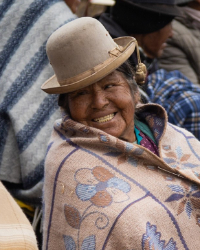With more than 3 million people living in Peru, Bolivia, and Chile, the Aymara people are today one of the most important ethnic groups in South America. Endowed with a strong ethnic cohesion based on the use of their own language (Aymara) and social organization, the Aymara have survived centuries of economic exploitation and forced acculturation, adapting successfully to the most diverse political contexts.
The first Aymara-speaking peoples settled in the areas around Lake Titikaka and the South Andean altiplano in the 12th century, after the destruction of the great ceremonial center of Tiwanaku. They were conquered by the Incan Empire in the 1400s and the Spanish Empire
starting in 1535. Spaniards used them as virtual slaves, and miners shoved them aside to find silver and gold.
In the same decade, the first stable missions were established in Aymara territory, marking the beginning of an active campaign to eradicate idolatry. In the Tarapacá mountains you can still see the hundreds of churches that were built during the colonial period, some of which are true architectural jewels.
The Aymara stretch an existence in a land of rocky, poor soil and harsh winds. Their crops include corn, quinoa, potatoes, beans, barley, and wheat. Grassy fields provide food for their alpacas and llamas. They use rowboats for fishing.
They live in extended families with a man, his wife, children, and his brothers and their families under one roof. This pattern is changing as the Aymaras become more urbanized. Many are earning wages in an urban setting. At the beginning of the 20th century, the Chilean authorities began an intense campaign to “Chileanize” the Aymara population of Tarapacá, through public education and military service, which was reinforced by the growing migration to the cities. The process gained momentum in the mid-twentieth century, due to the impoverishment of Aymara communities in the interior and the boom that the Arica region experienced after the establishment of a free port.
The Aymara who migrated to the coastal cities of Tarapacá created complex exchange networks with their peasant relatives, while taking advantage of the opportunities opened up by economic integration with Peru and Bolivia in the 1990s. Predominantly urban, today's Aymara population has managed to recreate its own identity in a complicated transition to modernity.
According to the Aimara cosmovision, there is an order in the universe, in which the physical, social, and spiritual spheres are in mutual equilibrium. In turn, the Aimara have the ancestral belief that there are three worlds: Alax Pacha (the world above or sky), Aka Pacha (the world around us), and Manqha Pacha (the world below). Each of these worlds is inhabited by hierarchically organized living beings who have a relationship with and influence over humans.
Like many indigenous people, they perform a variety of rites to have contact with the spiritual world as well as rites that involve changes in the social life, such as birth, death, marriage, or getting a relevant position within the community.
Many important festivities are associated with patron saints: St. James, the Feast of the Crosses, St. John and St. Peter, Pentecost, the Virgin of Candelaria, among others. In addition, there are festivities associated with special moments in the religious calendar: Easter, All Saints' Day and Christmas.
Although they have a high percentage of Christians, most Aymaras adhere to a Christian faith that centers on the afterlife and heaven. For their daily lives, they call upon diviners, magicians, and medicine men. There is also a strong Evangelical presence among them that can bring the Christ of the Bible to their families and beyond.
They are facing health problems related to his respiratory tract, due to his work on the land. They need to find a middle ground between traditional medicine and allopathic medicine to achieve physical well-being.
Aymaras need support in their efforts to protect the environment and recover their natural resources to face climate change and desertification in the forests.
Pray for the Aymara people to overcome the historical abuse of the Catholic Church and put their faith in Jesus Christ and none other.
Pray for Aymaras who love the Lord to disciple others to make more disciples.
Pray for an abundant harvest for the Aymaras this year as a testimony of his power and goodness. May they give him praise!
Pray that Aymaras abandon their magical worldview to look to Jesus Christ as their sustainer.
Scripture Prayers for the Aymara, Chilean in Chile.
https://www.britannica.com/topic/Aymara
https://www.conifa.org/en/members/aymara/
https://www.memoriachilena.gob.cl/602/w3-article-605.htm
https://bdpi.cultura.gob.pe/pueblos/aimara
| Profile Source: Joshua Project |











